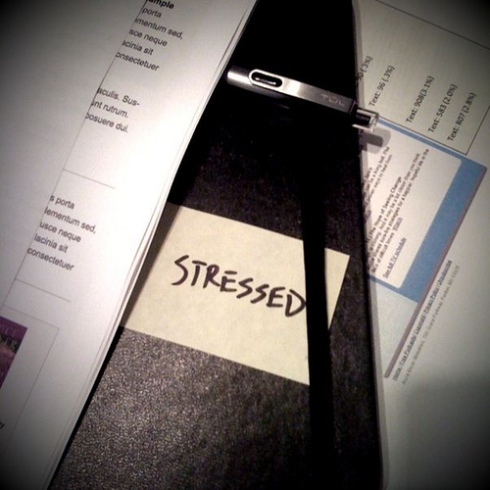You are currently browsing the monthly archive for May 2011.
Photo by kingfishpies/Flickr.com
The end of the semester is here, and alas, I’m burned out.
I hear this from other people all the time. The feeling of burnout is unique — even if you get several hours of sleep to recover, the cumulative effects of pressure and stress carry over to each day.
That’s why Scientific American‘s recent coverage of burnout piqued my interest, mainly because I feel at the hands of such things.
Although burnout lacks a definition in the DSM-IV, the article reports that an increasing number of psychologists are distinguishing it from other disorders such as depression and proposing it be taken more seriously. The article highlights the research of Agneta Sandström, who focuses on burnout’s impact on cognitive functioning. She discovered that, in fact, feeling burned out has a negative effect on our cognitive processes, diminishing our memory and ability to concentrate.
This is probably why people who experience burnout feel like they are doing more and getting less done (stress: 1, Marianne: 0); why people have issues falling asleep (2-zip), and why there’s no line between work and personal life (three strikes, I’m out).
But before pity parties ensue, I should note how fortunate I am to be able to attend grad school and still work as a freelancer. Time management is tough, but my largest inconvenience is missing the bus. Yeah… That’s about it.
I researched the man who coined “burnout” to find out that, well, his life was plagued with far more serious troubles than missing the bus. Herbert Freudenberger, the psychologist who conceptualized the term, grew up in Nazi Germany and witnessed his Jewish family being hauled away. After escaping, he moved in with his aunt, who forced him to live in her attic without a bed, according to Freudenberger’s obituary in The New York Times.
I can’t say I’ve experienced anything as heart-breaking as that, but I can relate to the small stressors that make Freudenberger’s concept so real to most.
Although there are many ways to cope with feeling burned out (most relate to stress management), I always find comfort in revisiting things that inspire me; things that make me feel good about what I’m trying to do with my writing.
One such thing is the video below. Discovery Communications, a company I routinely work for, couldn’t say it better: The world is just awesome.

Marc Hauser, whose research has been retracted and scrutinized, serves as a recent example of science media taking a closer look at the scientific process. Photo taken from the Harvard Gazette. By Kris Snibbe/Harvard News Office.
How often do retracted studies make headlines?
Think about it.
I can only recall a handful of studies that circled back after they were championed as new findings months earlier. Most recently, Marc Hauser‘s primate cognition work for the journal Science comes to mind. After being called out for fraudulent research and fudged data, Hauser’s study was retracted. His previous findings began to be questioned as well.
Yet this week Science re-released the results of his work, which were replicated from the original 2007 study in question. He and his colleagues have provided video to ensure the soundness of their results.
But setting the record straight doesn’t do much for Hauser’s already tarnished reputation. Which leads me to the question: Why don’t we hear more about retractions for other research? Visibility in the most prestigious journals could have something to do with it. Intentional deceptioin versus accidental errors with data matter too. But I find this somewhat startling, especially considering John Ioannidis’ suggestion that much of medical research is flawed and even outright wrong.
This question — along with how embargoes and the Ingelfinger Rule shape the production of science news — will be covered in a research paper I’m working on. Thankfully, I’ve had the help of two science writers with a keen eye for these issues.
Ivan Oransky, who leads the blog Embargo Watch and co-authors the blog Retraction Watch, is definitely a leader to follow. I was fortunate enough to catch lunch with him, my adviser and a few colleagues last fall. John Rennie has also shared his ideas about why he thinks journalists should go above and beyond the embargo system to provide the public with diverse science news, not copy similar to press releases.
I plan to flesh out more of these ideas on this blog after I finish my paper.
But in the meantime, I want to hear from you. Which studies (if any) have you heard/read about because they’ve been retracted? Do you think the lack of coverage misleads public perception of science and how it works?

